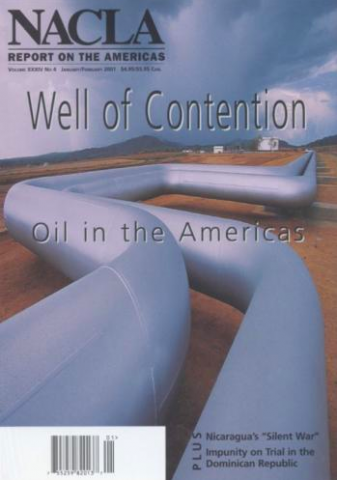This piece was published in the January/February 2001 issue of the NACLA Report.
"Oil, more than any other commodity," comments Fernando Coronil in his masterful study of Venezuela, The Magical State, "illustrates both the importance and mystification of natural resources in the modern world." There is no doubting oil's importance: "Post-industrial" as the U.S. economy has become, it is perched atop an oil-driven global economy. The long U.S. boom has rested on cheap costs of production, low clean-up costs and easy, low-rent access to a plentiful supply of raw materials—all in an economy in which oil fuels production, transportation and comfortable consumption.
There is also no doubting oil's mystification: Economists—whose dismal language has become "natural" in this neoliberal age—treat oil as simply another produced-to-be-sold commodity, disembodied from its natural, national and cultural origins, and from all those who have the bad fortune to be in the way of its discovery.
In the oil-producing countries of Latin America, struggles over oil raise a host of fundamental questions: Who profits? Who bears the costs? Who determines to what uses the profits are put? Who decides where, when and how to explore, drill, pump and sell‹and what should be done about communities that resist exploration? To whom does the subsoil—and the land and oceans themselves—belong?
Pemex, Mexico's state-owned oil company, says energy analyst David Shields, is not only vital to the Mexican economy, but is "a source of national pride and a key to Mexico's identity, embodying the widespread belief of Mexicans that it enables them to have sovereign control over their destiny." That same belief applies—even more so—to the region's largest oil exporter, Venezuela, a nation whose very identity, for nearly a century, has been that of an "oil nation."
But the pressures to privatize are intense, as is the push for Pemex and for Venezuela's state company, PDVSA, to act "naturally" like profit-driven businesses, with no direct concerns for national development. In both major oil-producing countries, such pressures have led to "Openings" to foreign capital in the national oil industry over the past decade. While Hugo Chávez's populist regime "is clearly determined to take oil policy in a more nationalist direction," his options, writes Luis Lander, are limited given the country's diminished sources of investment capital and its need for friendly relations with its largest export market, the United States.
As Sarah Town and Heather Hanson show, however, in their brief portrait of the Mexican oil state of Tabasco, nationalization, by itself, has not brought democratic control. "Environmental degradation is one way the government passes oil development costs onto Gulf Coast communities," write Town and Hanson. Pemex's depredations in Tabasco rival those of the transnational Texaco, described poignantly by Chris Jochnick and Paulina Garzón, in Ecuador. In response to these depredations, as nationalists and socialists struggle for sovereign control over the oil, there is an equally powerful grassroots struggle for democratic control within the oil-producing countries.
So the questions remain: Who reaps the global profits? Who pays the global costs? For whom does the oil flow? Resistance to big oil, as Michael Tanzer makes clear with his provocative proposal for Third World solidarity, is resistance to the enrichment of the North at the expense of the South. It is also resistance to global despoliation and to the growing commodification of all social relations. And there is resistance within the resistance, as aggrieved communities face off against unresponsive governments. "Oil isn't for the nation," a Tabasco farmer tells Town and Hanson, "it is only for a chosen few." It may be, as Jochnick and Garzón suggest, that grassroots vigilance and activism are necessary for even so modest a goal as a "sustainable compromise."

